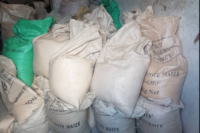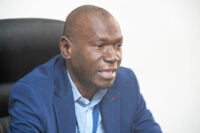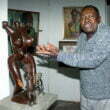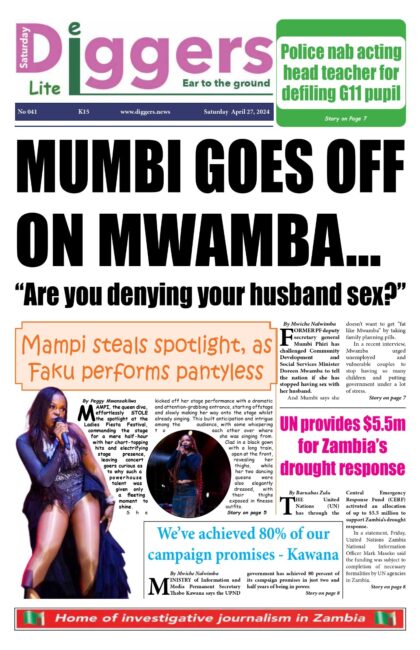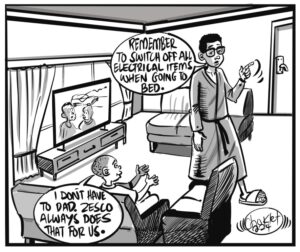A week ago when he featured on Hot FM Radio, former justice minister Mr Wynter Kabimba State Counsel said he stopped buying or reading newspapers in Zambia because they have nothing to offer him. The former secretary general of the ruling Patriotic Front added that he avoids print media journalists who like to call him so that he can join those that are practising politics of insults like Mr Chishimba Kambwili.
“Everybody’s ideology is about insults and how to humiliate and demean someone else across there, and you, the press, has contributed. You also think that the only way you can sell the image of your station is by bringing someone here who is calling everybody ‘Pompwe’, ‘nibakabolala aba, ba pompwe (they are thieves, despicable thieves), they are corrupt’, and everyone is cheering ‘eee eee eee this is the message’, and you start running that as a headline throughout the day, as if it changes the price of oil in Iraq. Print media, same, if they don’t put a sensational headline, they think nobody will buy it,” observed State Counsel Kabimba.
“During Michael Sata’s time,” he continued, “when you saw the name ‘Sata’ in the headline, whatever it was they said about him, you bought The Post. That culture has continued. I have stopped buying the print media myself in this country; there is nothing that they can tell me that I can learn from them. I don’t want to be covered for insults. And you know what I tell some reporters when they phone me? I tell them ‘try ba Kambwili, not me on that one’.”
We would like to start by appreciating the criticism from the learned State Counsel. We believe his message is simply that, we who produce newspapers must not be carried away by the foul language of politicians in order to sell our news. He is advising us to follow the issues and give sober debates priority space in our packaging of news. This is good counsel from a man whom we respect so much, and we embrace it.
But we will be dying inside if we pretend that we don’t take issue with the packaging of his criticism for the media that is always there to give him a platform on which he contributes to national debate. We were taken aback to hear that this is how useless and inconsequential we are as newspapers to his political career.
It would have been less painful to hear this from a riff-raff who has no clear identity in the country and knows nothing about the importance of an independent press that exercises its freedom in news judgement. Hearing this condemnation from a man, who wants to be Republican President in less than three years’ time, was depressing. We expected that State Counsel would know that newspapers give space to as many voices as possible in order to broaden the discourse.
To be honest, this is not the Wynter Kabimba we have known for years – a man who has taught us so many valued life lessons as we developed our careers covering him as a news source. Surely, there is something very serious that we don’t know that is happening to learned State Counsel, and we can’t wait for whatever that is to be unveiled so that our minds can stop speculating.
By the way, we have difficulties believing that comrade State Counsel Kabimba doesn’t buy or read newspapers at all, because when we make mistakes in any of our stories, he is one of those respected sources who call to say: ‘you have used a wrong word there, the correct word is this one’. So, we think he takes his time to read newspapers because that’s what intellectuals do to stay informed. But assuming that he truly finds newspapers so useless and uninformative, we don’t think it was in his best interest to go on radio and denounce the press in that manner.
We have an idea what is going on here. This dislike for print media that comrade learned State Counsel Kabimba is exhibiting is convenient for him because it suits the slow lane in which he finds himself politically. We believe that Mr Kabimba has taken his political career to the drawing board before he relaunches himself with vigour again; and while he is in that position, he can afford to find all sorts of excuses for denouncing the free press.
His disgust for Honourable Chishimba Kambwili’s language is one such excuse that we can’t buy for his dislike of the print media. Why do we say this? Well, because there is nothing that Honourable Kambwili is saying against the Patriotic Front and President Edgar Lungu, that himself Mr Kabimba didn’t say about the MMD and former president Rupiah Banda.
In case anyone has forgotten out there, State Counsel Kabimba is the PF Secretary General who led Parliament into removing Mr Banda’s immunity from prosecution because he believed the former president was a corrupt criminal who had looted public resources with the help of his children. This information is still recorded in public domain because comrade Kabimba used every opportunity he got on radio, television and newspapers to talk about the “criminality of Rupiah Banda”. Yes, he used newspapers to campaign against the MMD until it was defeated and he used newspapers to expose the alleged criminality of its defeated leader.
That is not all, before he was fired by Michael Sata, the former justice minister used newspapers to wage his battle against his arch political rival in the name of Geoffrey Bwalya Mwamba who was Defence Minister at the time. The fight that these two had was worse than the battle of words that Honourable Kambwili is engaging in with the PF, because people died in those violent clashes. We are not suggesting that Mr Kabimba threw a stone at GBM’s camp, but his supporters did.
So, when we look back, we find that Mr Kabimba has been involved in more fierce and deadly political battles, and he has also gone to great lengths accusing a political rival of theft and corruption. Why then is he so disgusted that this man called Chishimba Kambwili is being given too much space to accuse President Lungu of being a pompwe, a thief? Kaya!
Once again, we have embraced the counsel from the learned comrade. But we hope that when the newspapers he dislikes today become of better use tomorrow or in 2021, he will be able to go back on radio and appreciate our small efforts in this thankless job of giving a voice to the voiceless.




